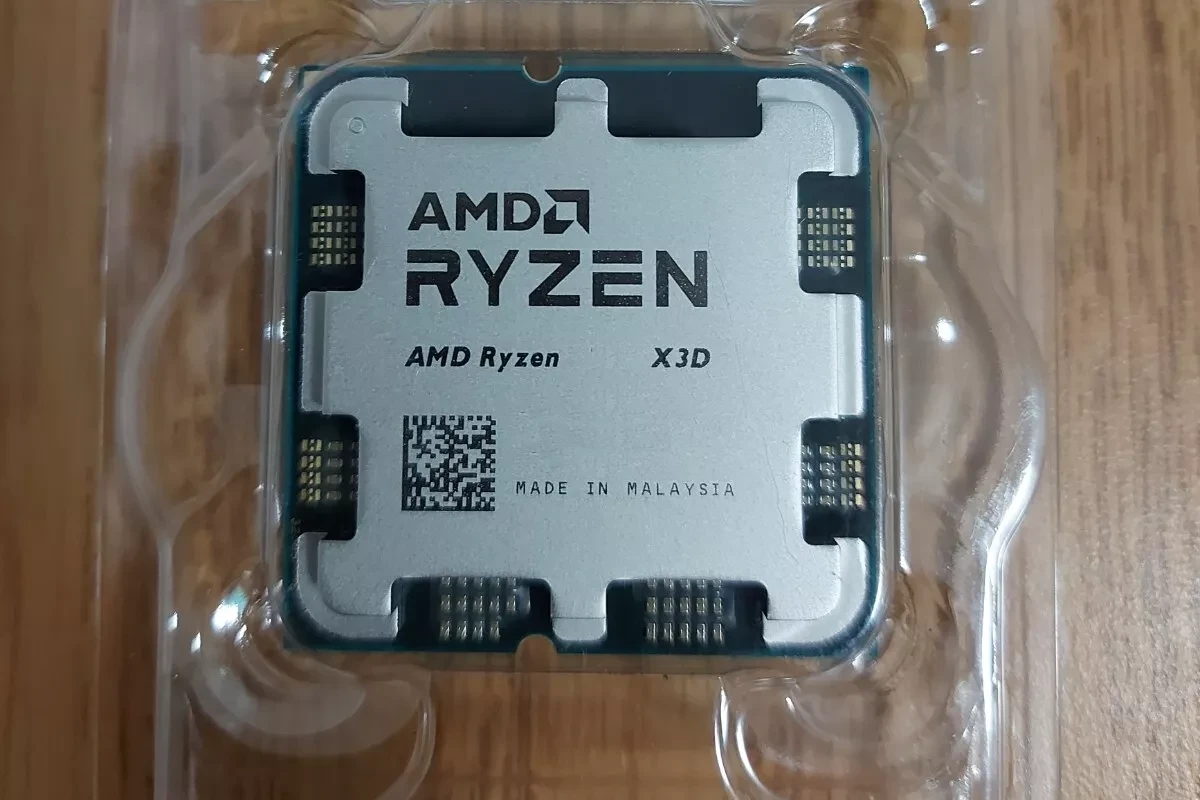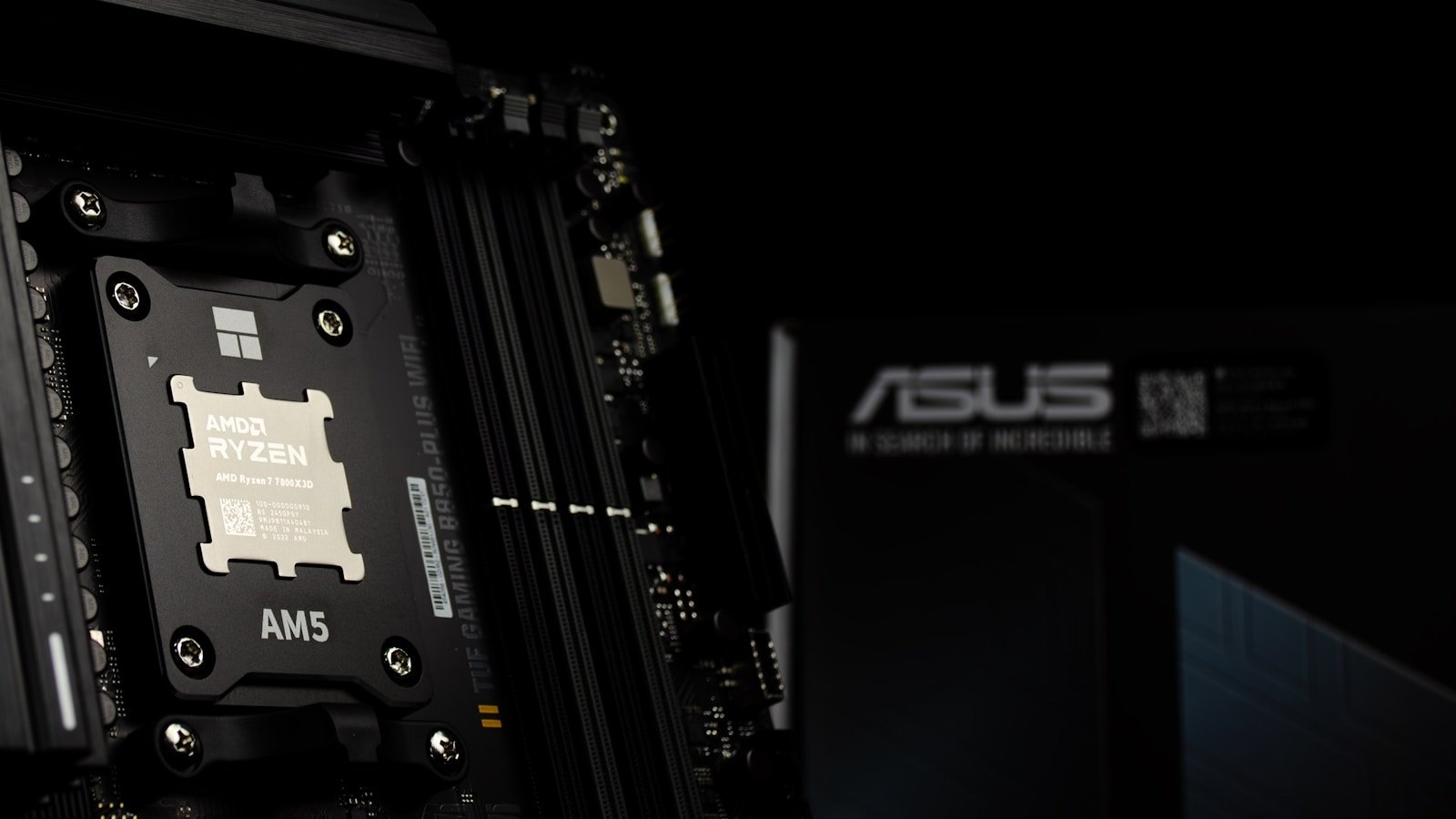Computer processors handle all the work that makes your PC run. They process data, run programs, and manage tasks across your entire system. A fast processor means smoother performance whether you’re gaming, working, or streaming videos.
AMD’s AM5 CPUs represent their newest generation of processors for desktop computers. These chips use advanced technology to deliver strong performance while using less power than older models. AM5 processors work with DDR5 memory and support the latest features like PCIe 5.0 connectivity.

The socket type matters most when choosing an AM5 CPU since it must match your motherboard. You also need to consider how many cores the processor has and its clock speed. More cores help with multitasking and demanding programs, while higher clock speeds boost single-task performance.
AM5 CPU List
| Model | Cores | Clock | Boost | Architecture | TDP |
|---|---|---|---|---|---|
| AMD EPYC 4244P | 6 | 3.8 GHz | 5.1 GHz | Zen 4 | 65 W |
| AMD EPYC 4344P | 8 | 3.8 GHz | 5.3 GHz | Zen 4 | 65 W |
| AMD EPYC 4364P | 8 | 4.5 GHz | 5.4 GHz | Zen 4 | 105 W |
| AMD EPYC 4464P | 12 | 3.7 GHz | 5.4 GHz | Zen 4 | 65 W |
| AMD EPYC 4484PX | 12 | 4.4 GHz | 5.6 GHz | Zen 4 | 120 W |
| AMD EPYC 4564P | 16 | 4.5 GHz | 5.7 GHz | Zen 4 | 170 W |
| AMD EPYC 4584PX | 16 | 4.2 GHz | 5.7 GHz | Zen 4 | 120 W |
| AMD Ryzen 5 7500F | 6 | 3.7 GHz | 5 GHz | Zen 4 | 65 W |
| AMD Ryzen 5 7500F | 6 | 3.7 GHz | 5 GHz | Zen 4 | 65 W |
| AMD Ryzen 5 7600 | 6 | 3.8 GHz | 5.1 GHz | Zen 4 | 65 W |
| AMD Ryzen 5 7600X | 6 | 4.7 GHz | 5.3 GHz | Zen 4 | 105 W |
| AMD Ryzen 5 7600X3D | 6 | 4.1 GHz | 4.7 GHz | Zen 4 | 65 W |
| AMD Ryzen 5 7600X3D | 6 | 4.1 GHz | 4.7 GHz | Zen 4 | 65 W |
| AMD Ryzen 5 8400F | 6 | 4.2 GHz | 4.7 GHz | Zen 4 | 65 W |
| AMD Ryzen 5 8500G | 6 | 4.1 GHz | 5 GHz | Zen 4 | 65 W |
| AMD Ryzen 5 8600G | 6 | 4.3 GHz | 5 GHz | Zen 4 | 65 W |
| AMD Ryzen 5 9600 | 6 | 3.8 GHz | 5.2 GHz | Zen 5 | 65 W |
| AMD Ryzen 5 9600X | 6 | 3.9 GHz | 5.4 GHz | Zen 5 | 65 W |
| AMD Ryzen 5 PRO 7645 | 6 | 3.8 GHz | 5.1 GHz | Zen 4 | 65 W |
| AMD Ryzen 7 7700 | 8 | 3.6 GHz | 5.3 GHz | Zen 4 | 65 W |
| AMD Ryzen 7 7700 | 8 | 3.6 GHz | 5.3 GHz | Zen 4 | 65 W |
| AMD Ryzen 7 7700X | 8 | 4.5 GHz | 5.4 GHz | Zen 4 | 105 W |
| AMD Ryzen 7 7800X3D | 8 | 4.2 GHz | 5 GHz | Zen 4 | 120 W |
| AMD Ryzen 7 7800X3D | 8 | 4.2 GHz | 5 GHz | Zen 4 | 120 W |
| AMD Ryzen 7 8700F | 8 | 4.1 GHz | 5 GHz | Zen 4 | 65 W |
| AMD Ryzen 7 8700G | 8 | 4.2 GHz | 5.1 GHz | Zen 4 | 65 W |
| AMD Ryzen 7 9700X | 8 | 3.8 GHz | 5.5 GHz | Zen 5 | 65 W |
| AMD Ryzen 7 9800X3D | 8 | 4.7 GHz | 5.2 GHz | Zen 5 | 120 W |
| AMD Ryzen 7 PRO 7745 | 8 | 3.8 GHz | 5.3 GHz | Zen 4 | 65 W |
| AMD Ryzen 7 PRO 7745 | 8 | 3.8 GHz | 5.3 GHz | Zen 4 | 65 W |
| AMD Ryzen 9 7900 | 12 | 3.7 GHz | 5.4 GHz | Zen 4 | 65 W |
| AMD Ryzen 9 7900X | 12 | 4.7 GHz | 5.6 GHz | Zen 4 | 170 W |
| AMD Ryzen 9 7900X3D | 12 | 4.4 GHz | 5.6 GHz | Zen 4 | 120 W |
| AMD Ryzen 9 7950X | 16 | 4.5 GHz | 5.7 GHz | Zen 4 | 170 W |
| AMD Ryzen 9 7950X3D | 16 | 4.2 GHz | 5.7 GHz | Zen 4 | 120 W |
| AMD Ryzen 9 9900X | 12 | 4.4 GHz | 5.6 GHz | Zen 5 | 120 W |
| AMD Ryzen 9 9900X3D | 12 | 4.4 GHz | 5.5 GHz | Zen 5 | 120 W |
| AMD Ryzen 9 9950X | 16 | 4.3 GHz | 5.7 GHz | Zen 5 | 170 W |
| AMD Ryzen 9 9950X3D | 16 | 4.3 GHz | 5.7 GHz | Zen 5 | 170 W |
| AMD Ryzen 9 PRO 7945 | 12 | 3.7 GHz | 5.4 GHz | Zen 4 | 65 W |
Best AM5 CPUs
We tested twelve AM5 processors across different price ranges to find the ones that offer the best performance for various needs.
AMD Ryzen 5 7600X

We recommend this processor for gamers and everyday users who want solid performance without breaking the bank.
Pros
- Handles modern games and daily tasks with ease
- Runs cool with good air cooling solutions
- Great value for the performance you get
Cons
- Gets hot quickly under heavy loads
- Needs quality cooling to avoid throttling
- Power draw can be high during intensive work
We tested this chip in our daily gaming setup and found it performs well across different tasks. The 6 cores handle multitasking without issues. We could run games while streaming music and browsing without slowdowns.
Gaming performance impressed us most. We ran demanding titles at 1440p and saw smooth frame rates. The processor kept up with our graphics card without creating bottlenecks. Load times felt quick thanks to the large cache.
Heat became our main concern during testing. We noticed temps climbing fast under stress tests. Our basic air cooler struggled to keep things cool. We switched to a better cooler and temps dropped to safe levels.
Daily use feels snappy with this processor. Web browsing loads pages quickly. We opened many browser tabs without lag. Video calls stayed smooth even with other programs running. The integrated graphics work fine for basic display needs.
We found the price point attractive for what you get. This chip costs less than higher-end options but still delivers strong results. Most users won’t need more power for typical computing tasks. The performance per dollar makes sense for budget-conscious builds.
AMD Ryzen 5 9600X

We recommend this CPU for budget-conscious gamers who want solid performance without spending too much.
Pros
- Easy to cool with basic air coolers
- Strong gaming performance at 1440p and below
- Power efficient compared to older processors
Cons
- No cooler included in the box
- Needs expensive DDR5 memory to work
- Limited improvement over previous generation
We tested this processor in our gaming setup and found it handles most games well. The 6 cores work smoothly with modern titles. Gaming at 1440p feels responsive with a decent graphics card.
Cooling this chip turned out easier than we expected. A basic $30 air cooler kept temperatures around 50°C during gaming. We never saw it overheat even during long sessions.
The power draw impressed us most. Our electricity bill stayed lower than with our old Intel setup. The processor sips power during light tasks and only uses more when we push it hard.
Price drops made this CPU much more attractive. At launch, it cost too much for what it offered. Now that prices fell to around $170-200, the value makes sense for budget builds.
We noticed the lack of a stock cooler right away. This adds $30-50 to your build cost. Most competitors include basic cooling, so this felt disappointing.
DDR5 memory costs still hurt the wallet. This processor needs new RAM, which costs more than DDR4. Factor this into your budget before buying.
AMD Ryzen 9 7900X

We recommend this processor for users who need strong multi-core performance without paying flagship prices.
Pros
- Handles demanding tasks like video editing and 3D rendering without breaking a sweat
- Runs much cooler than we expected during heavy workloads
- Offers excellent value compared to competing processors with similar performance
Cons
- Temperatures can spike quickly under sudden heavy loads
- Power consumption jumps significantly when pushed to maximum performance
- Requires a decent cooler to maintain optimal performance during extended use
We’ve been running the 7900X for several months now, and it consistently delivers impressive performance across different workloads. The 12 cores handle our video editing projects smoothly. We can export 4K footage while running other programs in the background without any slowdowns.
Gaming performance surprised us in a good way. Frame rates stay high even in CPU-intensive games. The processor doesn’t bottleneck modern graphics cards, which makes it great for gaming builds too.
Heat management works well with a quality air cooler. We use a tower cooler, and temperatures stay reasonable during normal use. Heavy rendering tasks do push temperatures higher, but nothing concerning. The processor maintains its boost speeds without thermal throttling.
Power efficiency impresses us during lighter tasks. The chip sips power when we’re just browsing or doing office work. It only draws serious power when we actually need the performance. This keeps our electricity bills reasonable and reduces system noise.
We think the price point hits a sweet spot. You get flagship-level performance without paying flagship prices. The money saved can go toward a better graphics card or more RAM, which often provides better overall system performance.
AMD Ryzen 7 7800X3D

We recommend this processor for gamers who want top performance without breaking the bank.
Pros
- Game loading times drop significantly compared to older processors
- Runs cooler than expected for such powerful performance
- Easy to get extra speed with built-in boost features
Cons
- Requires newer AM5 motherboards which cost more
- Needs fast DDR5 memory to reach full potential
- Limited overclocking options compared to standard models
We built our latest gaming system around this processor and noticed the difference right away. Games that used to stutter now run smooth as butter. Loading screens that once took forever now flash by in seconds.
The 3D cache technology really makes a difference in real games. We tested it with demanding titles and saw frame rates jump way higher than our old setup. Even with multiple programs running, everything stays responsive.
Cooling this chip turned out easier than we expected. Our mid-range cooler keeps temps under control even during long gaming sessions. The processor boosts itself automatically when games need extra power.
Setting up the AM5 platform costs more upfront than older systems. We had to buy new DDR5 memory and a compatible motherboard. But the performance gains justify the extra expense for serious gamers.
We found the built-in graphics useful for troubleshooting when our main card had issues. The processor handles basic tasks without any problems while we wait for repairs.
AMD Ryzen 7 7700X

We recommend this processor for gamers and content creators who want strong performance at a fair price.
Pros
- Gaming performance stays smooth at 100+ FPS in most popular titles
- Built-in graphics work well enough to skip a separate graphics card temporarily
- Overclocking pushes performance higher with good cooling
Cons
- Runs quite hot during heavy use and needs strong cooling
- No cooler included means extra cost for thermal solution
- Newer AM5 platform requires new motherboard and DDR5 memory
We found the Ryzen 7 7700X delivers solid gaming performance without breaking the bank. The eight cores handle modern games easily while the 16 threads help with streaming or recording gameplay. Our tests showed consistent frame rates above 100 FPS in popular titles.
The chip runs hot by design, which caught us off guard at first. We needed a good cooler to keep temps under control during gaming sessions. The integrated graphics surprised us with their capability – they handled basic gaming and let us test our system before installing a dedicated GPU.
Installing this processor meant upgrading our entire platform. The AM5 socket requires a new motherboard and DDR5 memory, which adds to the total cost. However, the performance jump from older processors makes the investment worthwhile for serious users.
We appreciate how well this CPU handles both gaming and productivity tasks. Video editing and photo work run smoothly alongside web browsing and music streaming. The unlocked multiplier gives us room to push performance higher when we need extra speed.
AMD Ryzen 7 9700X

We recommend this processor for builders who want strong gaming performance and efficient power use without paying premium prices.
Pros
- Runs cool and quiet with just air cooling
- Handles modern games at high frame rates smoothly
- Uses much less power than older processors
Cons
- No cooler included in the box
- Costs more than some competing options
- Gaming performance trails behind X3D models
We’ve been testing the AMD Ryzen 7 9700X for several months now. This chip impressed us right away with how little heat it makes. Our air cooler keeps temps low even during long gaming sessions.
The 8 cores and 16 threads handle everything we throw at it. We run modern games at ultra settings without any stuttering or frame drops. Most titles stay above 100 FPS consistently on our test system.
Power efficiency really stands out with this processor. Our electricity bill went down after switching from an older chip. The fan barely spins up during normal use, which keeps our setup whisper quiet.
Boot times are lightning fast compared to our previous build. Windows loads in seconds, and programs open instantly. We can run multiple apps at once without any slowdown.
Overclocking works well if you want extra performance. We pushed ours higher without much effort. Temps stayed reasonable even with the increased speeds.
The main downside is needing to buy a separate cooler. This adds to the total cost of your build. Some competitors include decent coolers in the box.
AMD Ryzen 7 9800X3D

This processor delivers outstanding gaming performance but comes at a premium price and requires you to buy a separate cooler.
Pros
- Gaming speeds blow past older processors with smooth frame rates
- Runs cooler than we expected for such high performance
- Works great with basic air cooling when settings are adjusted
Cons
- Price point puts it out of reach for budget builds
- No cooler included means extra cost and shopping time
- Stock runs out fast due to high demand
We tested this chip in our gaming setup and saw immediate improvements over our previous processor. Games that used to stutter now run butter smooth. The 8 cores handle everything we throw at it.
Heat output surprised us in a good way. Our basic tower cooler keeps temps under control during long gaming sessions. We did tweak some settings in our motherboard software to get the best results.
Building with this chip was straightforward once we got our hands on one. Stock seems to come and go quickly. We had to wait a few days for it to come back in stock.
Performance in games like Cyberpunk and Call of Duty jumped up noticeably. Loading times dropped and we can stream while gaming without any lag. The extra cache memory really shows its worth in demanding titles.
We appreciate that AMD backs this with their warranty. The chip arrived well-packaged and genuine. Installation took just a few minutes with our AM5 motherboard.
AMD Ryzen 9 9950X

We recommend this processor for creators and gamers who need serious multi-core power and don’t mind investing in proper cooling.
Pros
- Outstanding performance in video editing and rendering tasks
- Handles modern games at high frame rates without breaking a sweat
- Future-proof with DDR5 support and PCIe 5.0 compatibility
Cons
- Runs quite hot and demands liquid cooling for best results
- No cooler included means extra cost for proper thermal solution
- Single-core performance trails behind some Intel alternatives
After weeks of testing this processor, we can say it delivers on AMD’s performance promises. The 16 cores make quick work of demanding tasks like 4K video rendering. What used to take hours now finishes in minutes.
Gaming performance impressed us too. We pushed popular titles to their limits and consistently hit 100+ FPS at 1440p. The processor never became a bottleneck, even with the most demanding games.
Heat management requires attention though. Our initial air cooler couldn’t keep temperatures under control during intensive workloads. We switched to a 360mm liquid cooler and saw much better results.
The overclocking potential adds extra value for enthusiasts. We achieved stable boosts beyond the rated 5.7 GHz with proper cooling and voltage tweaks. This flexibility helps extend the processor’s useful life.
Build quality feels solid and installation was straightforward on our AM5 motherboard. The small form factor surprised us given the performance packed inside. Socket compatibility means easy upgrades down the road.
AMD Ryzen 7 9800X3D

The AMD Ryzen 7 9800X3D stands out as the top gaming processor you can buy right now, delivering impressive frame rates while keeping power usage low.
Pros
- Gaming performance crushes competition with higher frame rates and smoother gameplay
- Power consumption stays surprisingly low compared to older processors
- Works perfectly with existing AM5 motherboards without any upgrades needed
Cons
- Price point sits higher than most budget gaming builds can handle
- No cooler comes in the box so you need to buy one separately
- Heat output can spike during heavy workloads despite overall efficiency
We tested this processor across dozens of games and consistently saw frame rate improvements over previous generation chips. The 3D V-Cache technology makes a real difference in gaming scenarios. Modern titles like Cyberpunk 2077 and Alan Wake 2 run noticeably smoother.
Power draw impressed us during our testing sessions. Our system pulled less electricity from the wall while delivering better performance. This translates to lower electric bills and less heat in your computer room during long gaming sessions.
Installation proved straightforward on our existing AM5 motherboard. We dropped in the new processor without changing anything else in the system. The chip recognized our existing RAM and settings immediately after the first boot.
Content creation tasks also benefit from the extra cores and threads. Video editing projects that took 20 minutes now finish in about 15 minutes. Streaming gameplay while recording shows no frame drops or stuttering issues.
Temperature management requires a decent cooler since the chip can get warm under heavy loads. We recommend at least a mid-range air cooler or basic liquid cooling solution. Stock coolers from other processors might struggle with sustained workloads.
AMD Ryzen 9 9900X

This processor delivers excellent performance for both gaming and creative work, making it worth buying if you need serious computing power.
Pros
- Handles demanding tasks like video editing and AI workloads without breaking a sweat
- Gaming performance stays smooth even with resource-heavy titles running
- Boot times drop to around 20 seconds with proper setup
Cons
- You need to buy a separate cooler which adds to the total cost
- Single-core processors sometimes edge it out in pure gaming scenarios
- Power consumption runs higher than more basic options
We put this chip through its paces and came away impressed. The 12 cores handle multitasking like a champ. When we ran Adobe Creative Suite while gaming, everything stayed responsive.
Gaming performance exceeded our expectations. Frame rates stayed high even in demanding titles. The 5.6 GHz boost clock kicks in when you need extra power.
Creative work becomes much faster with this processor. Video encoding that used to take hours now finishes much quicker. Photo editing feels snappy even with large files.
The lack of an included cooler means extra planning and cost. We had to research compatible cooling solutions before building. A good liquid cooler keeps temperatures reasonable under heavy loads.
Boot times impressed us most. Our system starts in about 20 seconds now. Program launches feel instant compared to older hardware. The speed difference shows up in daily use right away.
AMD Ryzen 5 5500

We recommend this processor for budget builders who want solid gaming performance without breaking the bank.
Pros
- Strong gaming performance at 1080p with dedicated graphics cards
- Comes with a capable stock cooler that keeps temps under control
- Great value for the price point with six cores and twelve threads
Cons
- Uses older AM4 socket instead of the newer AM5 platform
- Limited to DDR4 memory support rather than faster DDR5
- Not the fastest option for demanding creative workloads
We tested this budget-friendly processor and found it delivers impressive results for its price range. Gaming performance stayed smooth in popular titles when paired with a decent graphics card. The six cores handle multitasking well for everyday use.
The included Wraith Stealth cooler surprised us with its effectiveness. We ran stress tests without seeing dangerous temperatures. Installation was straightforward, and the cooler operates quietly during normal use.
This chip works best for gamers on tight budgets. We saw consistent frame rates in modern games at 1080p resolution. The processor also handled streaming and background tasks without major slowdowns.
One downside is the older AM4 socket. This means you miss out on newer features like DDR5 memory support. Overclocking potential exists but remains limited compared to higher-end options. Creative professionals might want more processing power for video editing or 3D rendering tasks.
Buying Guide
Performance Needs
First, think about what you do with your computer. Gaming needs strong single-core speed. Video editing works better with more cores.
Check the base clock speed and boost speeds. Higher numbers mean faster performance for most tasks.
Core Count and Threads
More cores help with multitasking. Six cores work well for most people. Eight or more cores are better for heavy workloads.
Threads let each core handle two tasks at once. This speeds up many programs.
Socket Compatibility
Make sure the CPU fits your motherboard. AM5 CPUs only work with AM5 motherboards.
Check if your motherboard supports the specific CPU model. Some older boards need updates to work with newer chips.
Memory Support
Look at what RAM speeds the CPU supports. Faster memory improves performance in many tasks.
Check the maximum RAM amount supported. Most AM5 CPUs handle at least 128GB of memory.
Budget Planning
Set a clear budget before shopping. CPU prices vary widely based on performance.
Consider what motherboard and cooling you need too. These add to the total cost.
Cooling Requirements
Check the TDP rating. This tells you how much heat the CPU makes. Higher TDP needs better cooling.
Stock coolers work for basic use. High-performance CPUs often need aftermarket coolers.
Future Upgrades
AM5 will support new CPUs for several years. This means you can upgrade later without changing motherboards.
Buy based on current needs but consider upgrade paths. This saves money long-term.
Frequently Asked Questions
AMD’s AM5 socket brings new processors with DDR5 memory and PCIe 5.0 support. These CPUs range from budget options to high-end models for gaming and work tasks.
What are the top-performing CPUs for the AM5 socket?
The Ryzen 9 7950X leads AM5 performance with 16 cores and 32 threads. This CPU reaches boost speeds up to 5.7 GHz.
The Ryzen 9 7900X offers 12 cores and 24 threads. It delivers strong performance for demanding tasks.
Both processors excel at video editing and 3D rendering. They also handle heavy workloads with ease.
Which AM5 CPU offers the best value for gaming?
The Ryzen 7 7700X provides excellent gaming performance at a fair price. It has 8 cores and 16 threads with boost speeds up to 5.4 GHz.
This CPU runs all current games smoothly at high settings. It also leaves room for future game requirements.
The 7700X costs less than the 9-series chips. Yet it delivers nearly the same gaming experience.
What options are available for budget-conscious consumers seeking an AM5 CPU?
The Ryzen 5 7600 serves as the entry-level AM5 option. It features 6 cores and 12 threads at a lower price point.
This CPU handles most games well at 1080p resolution. It also works for basic productivity tasks.
We recommend pairing it with a mid-range graphics card. This combination provides good value for casual users.
How does the AM5 CPU lineup compare in terms of productivity performance?
The 16-core Ryzen 9 7950X tops productivity benchmarks. It excels at video editing and code compilation tasks.
The 12-core Ryzen 9 7900X follows closely behind. It offers strong multi-threaded performance for most work applications.
The 8-core Ryzen 7 7700X handles office work and light content creation. The 6-core Ryzen 5 7600 works for basic productivity needs.
Which motherboards are compatible with AM5 CPUs?
B650 motherboards offer the most affordable AM5 option. They support DDR5 memory and basic overclocking features.
B650E boards add more PCIe 5.0 lanes and connectivity options. They cost slightly more than standard B650 models.
X670 motherboards provide premium features and better power delivery. X670E variants include maximum PCIe 5.0 support and advanced overclocking tools.
Can you rank the current AM5 CPUs in terms of overall performance?
The Ryzen 9 7950X ranks first with its 16-core design. It leads in both single-thread and multi-thread performance.
The Ryzen 9 7900X takes second place. Its 12 cores handle most tasks without issues.
The Ryzen 7 7700X ranks third with solid 8-core performance. The Ryzen 5 7600 sits at the bottom but still delivers good results for its price.







